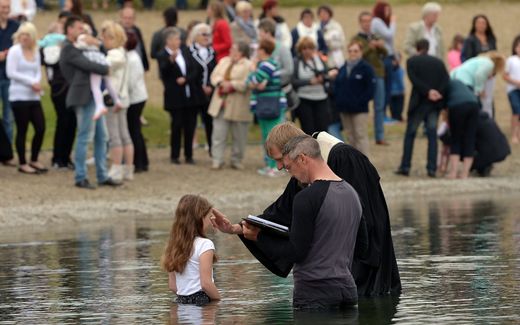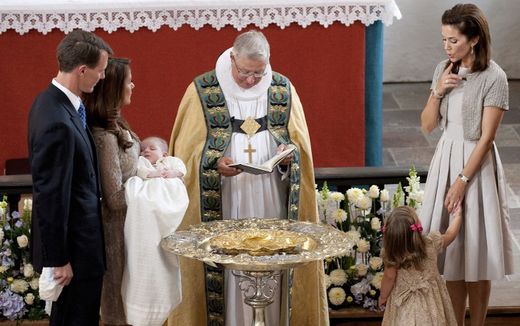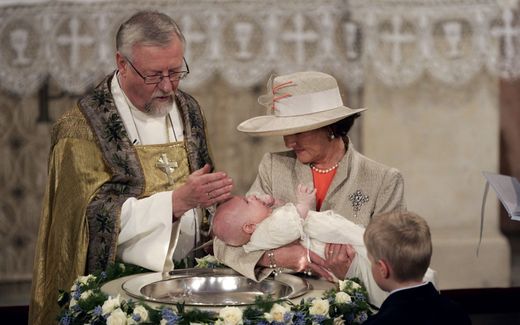Baptism by woman pastor is no sacrament, says Dutch church

Which baptism is valid and which one not? For some churches, this is a real dilemma. Photo Getty Images
Western Europe
The small Dutch denomination Reformed Congregations in the Netherlands (GGiN) does not recognise a baptism administered by a female church minister. That was confirmed this week at the church’s synod.
The GGiN is one of the many Reformed denominations in the country that all know infant baptism. With 23,000 people, the GGiN is one of the smaller Reformed communities in the country. Between the more conservative denominations, there is quite a lot of exchange. Marriage of partners from different Calvinist communities is quite usual. And therefore, recognition of baptism has become almost a routine issue: important but clear.
The consensus within the Reformed communities is that the church always recognises baptism if a legitimate church official administers the sacrament and is administered in the name of the triune God (Father, Son and Holy Spirit). That means even baptisms administered by a Roman Catholic priest are not questioned even in most Calvinist churches. In practice, there are seldom debates about the recognition of baptism.
But the GGiN this week put another issue on the table: how to deal with a new member who comes from another church and is baptised by a female pastor? The reasoning of the synod this week was, according to a report in the daily Reformatorisch Dagblad, that a woman can never be lawfully recognised as a church official, based on Paul’s First Letter to the Corinthians 14:34: “The women should keep silent in the churches. For they are not permitted to speak, but should be in submission, as the Law also says.” Following that argument, the church asks: Water was sprinkled, but was it a sacrament?
Witch-hunt
It would be quite unique that the GGiN ever welcomed a new member who had been baptised by a female minister. But the synod’s moderator, Rev. J. A. Westrate, says that the matter goes back to actual cases, according to a report in the Nederlands Dagblad. In the Netherlands, female pastors belong to the more liberal wing of the Reformed churches, and the GGiN to the conservative. “Cross-border traffic” between those wings is very scarce.
The synod also decided that the church would not check by what servant newcomers are baptised. “We don’t go on a witch-hunt”, one delegate summarised.
Suppose the church finds someone baptised by a female minister. In that case, it also shies away from re-baptising them, since this is seen as “the error of the Donatists and the Anabaptists”.
Tension
The GGiN responds to two issues that are quite current in the Dutch Christian world at the moment: re-baptism and female office-bearers.
Some independent (non-Calvinist) Evangelical churches are pretty active in re-baptising news believers, usually coming from traditional Reformed congregations. This has led to some tension in some local situations on the Dutch Biblebelt.
In such cases, the GGiN chooses the radical option too: members who go for re-baptism are seen as having withdrawn and will be scrapped from the books. But they are welcomed back in case of repentance.
The other issue is women as office-bearers in the church. Until fifteen years ago, almost all orthodox Reformed communities in Holland only had men as deacons, elders and ministers. In the past years, several denominations changed that position. They followed the trend seen in other Reformed and Presbyterian churches worldwide: to accept female pastors.
In that sense, the decision by the GGiN is an answer to current issues in the direct church environment. The church says it had looked at the protocols of a synod in the early 50s from the Netherlands Reformed Congregations, the denomination from which the GGiN originated. Research by the Reformatorisch Dagblad showed, however, that this decision was almost forgotten.
Sectarian
On reactions, Reformed people from other denominations responded to the decision. The Dutch daily Nederlands Dagblad –that follows a softer Calvinist direction– spoke about a “sectarian decision”.
On Twitter, Pastor Matthijs Schuurman tried to give understanding by saying that almost all denominations said comparable things after the Dutch people’s church opened the way for female pastors in the 50s.
Other theologians, like the Protestant Prof. Arnold Huijgen, took a sharper position and is of the opinion that the GGiN is “leaving the Reformed tradition”, although he nuanced this later.
Related Articles








